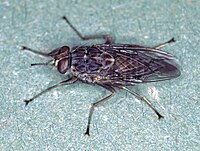
Photo from wikipedia
Son and colleagues recently reported [1] the phenotypic effects of the infection of the endo-symbiont Spiroplasma in the tsetse fly Glossina fuscipes fuscipes , a major disease vector in humans.… Click to show full abstract
Son and colleagues recently reported [1] the phenotypic effects of the infection of the endo-symbiont Spiroplasma in the tsetse fly Glossina fuscipes fuscipes , a major disease vector in humans. The authors examined the impact of Spiroplasma on the reproductive biology of G . f . fuscipes , showing that infection by the pathogen modifies sex-biased expression in reproductive tissues, ultimately affecting female fecundity as well as sperm motility and competitiveness among other phenotypes. The effect on male reproductive biology is presented in connection to the Vector Base gene ID GFUI025244, i . e ., a presumed ortholog to the Drosophila melanogaster coding gene Sperm-specific dynein intermediate chain ( Sdic ). In fact, the interpretation of the results is heavily reliant on the functional and phenotypic attributes of Sdic in D . melanogaster . ,
Journal Title: PLoS Pathogens
Year Published: 2022
Link to full text (if available)
Share on Social Media: Sign Up to like & get
recommendations!